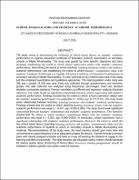| dc.contributor.author | Hassan, Muhammad Bashir | |
| dc.date.accessioned | 2017-06-22T13:45:12Z | |
| dc.date.available | 2017-06-22T13:45:12Z | |
| dc.date.issued | 2015 | |
| dc.identifier.citation | Hassan, M. B. (2015). School based factors and students’ academic performance At UACE in secondary schools in Mbale municipality, Uganda. Thesis (Masters). Islamic University in Uganda. | en_US |
| dc.identifier.uri | http://hdl.handle.net/20.500.12309/223 | |
| dc.description.abstract | The study aimed at determining the influence of school based factors on students’ academic performance in Uganda Advanced Certificate of Education (UACE) examination in secondary schools in Mbale Municipality. The study was guided by three specific objectives and these included; establishing the extent to which school supervision relates with student’s academic performance; determining the extent to which teaching- learning resources relates with students’ academic performance; and establishing the extent to which teachers’ commitment relate with students’ Academic Performance at Uganda Advanced Certificate of Education Examinations in secondary schools in Mbale Municipality. A cross-sectional survey research was used in this study and this employed quantitative and qualitative approaches. The total population under study was 386 and a sample of 200 was used. Data was collected through questionnaires and interview guides. The data collected was analyzed using frequencies percentages, mean and standard deviation (univariate statistics), Pearson correlation co-efficient and regression analysis (bivariate statistics). The study found no significant relationship between school supervision and student’s academic performance. Findings showed that the extent to which school supervision relates with the students’ academic performance was negligible (r = 0.064, sig= 0.376>0.05). The study found weak relationship between teaching- learning resources and students’ academic performance. Findings showed that the extent to which teaching-learning resources relates with the students’ academic performance was weak (r = 0.247, sig= 0.000<0.000). The study found weak significant relationship between teachers’ commitment and students’ academic performance. This therefore showed that the extent to which teachers’ commitment relates with the students’ academic performance was weak (r = 0.353, sig= 0.000<0.000). In conclusion, school supervision had in significant relationship with students’ academic performance. However, the extent to which the two school based factors (teaching-learning resources and teachers’ commitment) relate with the academic performance of students at UACE in secondary schools in Mbale Municipality was moderate. Recommendations of the study were; the head teachers should give more time and commitment to support teachers so as to adequately prepare for lessons. Teachers should use lesson plans with clearly assigned activities and tasks as a way of assisting the students to engage in the learning activities productively. The head teachers and education policy makers should advocate for teacher guides about structuring of lesson plans. In-service training programmes’ should be initiated to address specific man power needs for teachers | en_US |
| dc.language.iso | en | en_US |
| dc.subject | School based factors | en_US |
| dc.subject | Uganda | en_US |
| dc.subject | Academic performance | en_US |
| dc.title | School based factors and students’ academic performance At UACE in secondary schools in Mbale municipality, Uganda | en_US |
| dc.type | Thesis | en_US |

